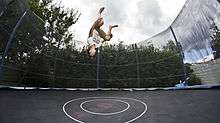Trampoline safety net enclosure

A trampoline safety net enclosure is a trampoline accessory that significantly reduces the chance of fall off and frame impact injuries.
History
The first commercially successful trampoline safety net enclosures were invented and patented by Mark Publicover in the United States and first sold there in 1997 by JumpSport Trampolines. By 2006 80% of all new trampoline sales included safety net enclosures.[1]
Safety benefits
While a trampoline is safest when only one person jumps at a time, in practice the enjoyment derived from multiple simultaneous jumpers means that this recommendation is often disregarded.[2] The benefit of an enclosure is that it keeps jumpers from falling off a trampoline or impacting the frame.[3]
Safety net enclosures vary from one manufacturer to another, such as the opening in the net so that jumpers may enter and exit the trampoline. The design of such openings may include: snap/Velcro system, zipper, or overlapping sections. The snap, zipper, and Velcro systems require the person entering to both open and close the entrance, allowing for the possibility of misuse, whereas the doubled over system avoids this requirement by being a passive solution.[4]
See also
References
- ↑ George Rutherford, M.S.; Natalie Marcy, B.S.; Alberta Mills, B.A. (April 2004). "Hazard Screening Report – Outdoor Activities and Equipment Generally Considered Children's Products, but also used by Adults" (PDF). Consumer Product Safety Commission. p. 18. Archived from the original on October 28, 2013.
A third product, trampolines, has been the subject of work by CPSC’s Office of Compliance and CPSC staff has worked with industry and others to strengthen the voluntary standard for these products to reduce the hazards. The injury frequency associated with trampolines increased significantly from 1997 to 2000, but the two years since have shown enough of a decline that the change from 1997 to 2002 is not significant.
- ↑ "Summer Safety: Trampoline Dangers". ABC News. July 24, 2007.
Doctors said even extra safety gear and adult supervision aren't enough to make trampolines safe, and one of the worst things is when kids play together. More than one kid on a trampoline increases the odds of injury because it becomes a lot easier for a child to lose his balance.
- ↑ Ronald A. Furnival, MD; Kellee A. Street, MD; Jeff E. Schunk, MD (May 1, 1999). "Too Many Pediatric Trampoline Injuries". Pediatrics. 103 (5): e57. PMID 10224201.
Recommendations in several recent reports regarding recreational trampoline use have included increased supervision, increased use of spotters, placing the trampoline at ground level, placing padding around the outside of the trampoline, enclosing the trampoline within a fence, and the avoidance of complex maneuvers.
- ↑ Jamie Sotonoff (July 5, 2009). "Suburban doctors, parents weigh in on the trampoline debate". Daily Herald. Chicago.
While jumping with her friends on a large, backyard trampoline over Memorial Day weekend, 8-year-old Hannah Rickett of Mount Prospect accidentally fell backward through the unzipped netting.
External links
- Patent 6,053,845 – Trampoline or the like with enclosure
- Patent 6,261,207 – Trampoline or the like with enclosure